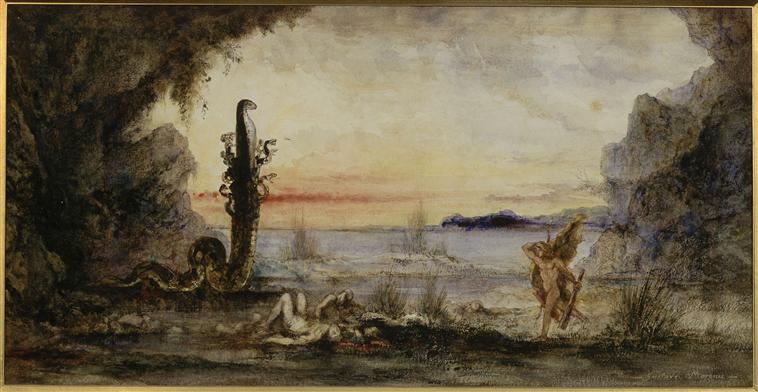Hesperia, Hesperides
07.16.2018Maidens of the Evening, the Hesperides are the nymphs of sunset. Beautiful and wise, their voices are enchantingly musical… And how clever these nymphs are at escaping being seen by quickly transforming into other objects! But how many of them are there actually? Who is their father? And where’s this garden that they inhabit?
Right at the start there was Chaos or eternal primordial confusion. From this sprang Nyx, the Goddess of darkness. Before marrying her brother Erebus she gave birth to a series of conditions that would be the lot of mortals: Destiny, Death, Sleep, Old Age, Discord, dark spirits, the Fates and the Hesperides…
These sisters kept the name of their country, Hesperia, the western land for the ancient Greeks where the sun set and the empire of night arose. It represented the fringes of the known world and its actual location varies depending on the narrative and on maritime advances. Hesperia was part of Italy, then Syrtes in Libya, Spain and Mauritania… In the western extremity the snowy peaks merged with the sky and the land plunged into the ocean: this was Mount Atlas, from whence we still owe the name given to the Atlantic Ocean. Punished, Atlas is a titan petrified by Jupiter or Perseus according to the stories. He lived there with his brother Vesper, the origin of the word “vespers” and the adjective “vesperal”, meaning of the evening.
In this dark place, golden apples twinkle in an orchard. This fruit is sacred because their magical power represents great danger. The garden of the Hesperides is therefore under guard. The sisterhood of nymphs are its first guardians. As they could not be trusted to guard the apples on their own, Hera, the wife of Zeus, queen of the heavens and Olympus, dispatched Ladon, a hundred-headed dragon whose eyes never closed and whose heads all spoke a different language, to guard them and to prevent the residents of the garden from eating its fruit.
These sisters were perhaps not the daughters of the original Night alone. Some big fellow may have been involved… But whom? Probably Atlas, the owner of this garden on its mountains sides. Mythologists say that Zeus or Phorcys were possible putative fathers. And how many Hesperides were there? Most often there were three: Aegle, Erytheia, Hesperis. Or isn’t it Aegle, Arethusa and Hesperethusa? Are there four, seven or eleven of them? Who knows, but the buzz continues.
One thing for sure: it was Hercules who completed the eleventh of his twelve labours by slaying Ladon and seizing the golden apples by tricking Atlas. Inconsolable after the loss of the fruit, the Hesperides had heavy hearts and turned themselves into trees for eternity. To every poet, every City, the necessity of this story.
The Hesperides had many nicknames including “Ephimeron aeidousas” : superb singers as they sang so expertly, some even akin to birds at nightfall. They were sometimes linked to and even confused with the Atlandides, the Hyades and the Pleiades, all daughters of Atlas… As for the golden apples… they may well have been oranges. Or more likely quinces. But one is never sure…it could be that they were actually sheep called mela (or apple in Greek) whose wool was spun to produce the golden fleece. One thing for sure though, a mother would be hard pushed to find her youngsters here.


